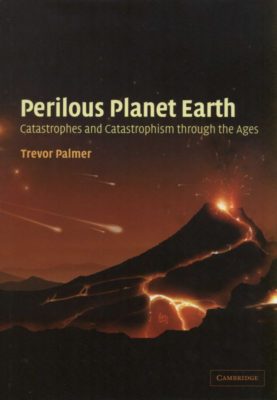Perilous Planet Earth: Catastrophes and Catastrophism through the Ages (2003) by Trevor Palmer is a book which describes itself as:
“.. about the threat to Earth from asteroids and comets within an historical context, looking at the evidence for past events within the geological and historical records.”[1]Trevor Palmer, Perilous Planet Earth: Catastrophes and Catastrophism through the Ages, 2003, Cambridge University Press (July 7, 2003), ISBN 0521819288. Back cover and publisher’s web site (retrieved Oct 28, 2008
Palmers provides several pages of comments on Velikovsky and his works, who he describes thus:
“… a Russian-born pyscho-analyst living in the U.S.A., [he] launched what was to become a comprehensive assault on the bastions of gradualism and orthodoxy, putting forward in his book Worlds in Collision a highly controversial catastrophist scenario which had some features in common with those of Kugler and Beaumont, and of the nineteenth century writers, Radlof and Donnelly. Velikovsky derived his theory of ‘planetary catastrophism’ not from scientific evidence but on interpretations of ancient myths and records from various part of the world.”[2]Trevor Palmer, Perilous Planet Earth: Catastrophes and Catastrophism through the Ages, 2003, ISBN 0521819288. Chapter 12 “Heretical catastrophists” http://books.google.co.uk/books?id=QuvQQFF6wIcC&pg=PA116&vq=velikovsky&dq=%22Perilous+Planet+Earth%22+velikovsky&source=gbs_search_s p.116
Book contents
- Introduction
Part I. Catastrophism: The Story of its Decline and Fall … and Resurrection
Section A. From prehistory to 1899: Catastrophism dominates for centuries, but then gives way to gradualism:
- 1. Mythology, religion and catastrophism
- 2. Hutton: fact and fiction about the origins of modern gradualism
- 3. Cuvier and Lamarck: choosing between extinction and evolution
- 4. Natural theology and Noah’s Flood: the high-water mark of catastrophism
- 5. Catastrophism, uniformitarianism and idealist philosophy
- 6. Lyell triumphant: gradualism dominates geology
- 7. Darwin and evolution
- 8. After the Origin: the triumph of evolutionary gradualism
Section B: From 1900 to 1979: Gradualism reigns supreme:
- 9. Neo-Darwinism: the Modern Synthesis
- 10. Phyletic gradualism
- 11. Gradualist perceptions of human evolution
- 12. Heretical catastrophists
- 13. Atlantis: rational and irrational theories of a ‘lost’ civilisation
- 14. Evolutionary mass extinctions and neocatastrophism
- 15. Punctuated equilibrium: a new evolutionary perspective
- 16. Human evolution: gradual or punctuational?
Section C. From 1980 to the present day: Catastrophism strikes back:
- 17. Evolution evolving
- 18. Into the new millennium: evolution today
- 19. Chaos in the Solar System
- 20. Catastrophes on Earth
- 21. The death of the dinosaurs: iridium and the K-T extinctions
- 22. The continuing K-T debate
- 23. Mass extinctions and the course of evolution
Part II. Catastrophes and the History of Life on Earth:
- 24. Extinctions large and small
- 25. Cyclic processes and mass extinctions
- 26. The uncertain origins of humankind
- 27. Ice ages in the Pleistocene epoch
- 28. Modern views of Atlantis
- 29. Natural catastrophes and the rise and fall of civilisations
- 30. Conclusions
- References
- Index.
See also
- Review in Journal of Scientific Exploration v.19 no.3, 2005, by C. L. Ellenberger online at JSE
- Review in Journal of Scientific Exploration v.19 no.3, 2005, by B. Cooke online at JSE
References
| ↑1 | Trevor Palmer, Perilous Planet Earth: Catastrophes and Catastrophism through the Ages, 2003, Cambridge University Press (July 7, 2003), ISBN 0521819288. Back cover and publisher’s web site (retrieved Oct 28, 2008 |
|---|---|
| ↑2 | Trevor Palmer, Perilous Planet Earth: Catastrophes and Catastrophism through the Ages, 2003, ISBN 0521819288. Chapter 12 “Heretical catastrophists” http://books.google.co.uk/books?id=QuvQQFF6wIcC&pg=PA116&vq=velikovsky&dq=%22Perilous+Planet+Earth%22+velikovsky&source=gbs_search_s p.116 |

